Where Do They Usually Do the Left Hip Surgery at
Overview
What is a hip substitute (hip arthroplasty)?
This surgery is where your hip (or parts of it) is replaced with a manmade implant (prosthesis). Information technology's usually performed happening adults later on other treatments like using a lambast or walker, weight loss, medicines and physiatrics have failed to help. You may need a hip replacement because of:
- Osteoarthritis.
- Inflammatory arthritis (creaky arthritis, psoriatic arthritis).
- Femoroacetabular impingement syndrome.
- Injuries, comparable a hip fracture operating room disruption from a dip.
- Developmental pelvic girdle dysplasia.
- An injury that didn't bring around right.
- Osteonecrosis (avascular necrosis).
- Neoplasms.
- Childhood hip disorders, comparable Legg-Calvé-Perthes disease and slipped capital limb epiphysis cerebri.
Because all surgery has risks, and prostheses can fail as time goes by, your healthcare provider may urge delaying a hip replacement until grievous symptoms are present.
What is the hip?
Your hip is a joint — a ball-and-socket joint — that connects the second joint bone (femoris) of your leg to your pelvis. Your femur has a "head" at its top that's shaped equivalent a ball, and it fits into the acetabulum (the socket). It's unbroken in situ by ligaments, tendons and muscles around the joint. Your hip is the most compromising and unrestrained-moving joint in your body and can move backwards and frontwards, to the lateral and tin can perform writhing motions.
What are the types of hip replacements?
There are two leading types of hip replacements:
- Total hip replacement (the just about common case): A tote up hip permutation switches both the leg bone read/write head and the acetabulum with a prosthesis.
- Partial hip replacement: A partial renewal substitutes the femoral direct only. This is typically done for patients with certain types of articulatio coxae fractures.
What charitable of health care provider performs hip replacements?
If a hip replacement is the best treatment for you, your healthcare provider may send you to an orthopaedic sawbones for evaluation. Your orthopaedic surgeon will evaluate your pelvic girdle joint with a full corporal test and X-rays and develop a treatment plan for how surgery give notice best benefit you.
How common are hip replacements?
Some 370,000 total hip replacements happen yearly in the U.S.
What symptoms may indicate that I need a hip replacement?
Some of the following symptoms English hawthorn represent related to conditions that hip replacements direct. They let in:
- Pain in the antecedent informed or groin.
- Painful sensation in the buttock and trochanteric realm.
- Pain with activity and at take a breather.
- Pain that gets worsened when you put weight on the stage.
- Stiffness/tightness of the hip.
- Exit of apparent motion.
- Difficultness quiescence.
- Difficulty walking.
- Difficulty putting on shoes and socks.
Who shouldn't go through a hip alternate?
Hip to replacement surgery isn't for everyone. Even if somebody is in pain and can't move their hip likewise as prospective, they aren't automatically considered for a hip replacement. You power be unsuitable if you have:
- Severe medical problems so much as heart failure, anemia, recent cardiac muscle infarct (heart attack), tottering angina pectoris and more. Mouth off to your healthcare supplier about issues that may unfit you.
- An active infection.
- An immature skeleton.
- Irreversible or permanent muscle weakness.
- Paraplegia, quadriplegia.
- A neuropathic (Charcot) conjunct.
- Severe morbid obesity.
Subprogram Details
Is a hip replacement surgery outpatient or inmate?
Most people need to stay in the hospital for all but one to two days.
How do I develop for surgery? What happens before a hip replacement?
In rescript to prepare for surgery, you'll schedule a serial publication of appointments to have testing and headway. During these appointments, studies including lab testing, urine analysis, an EKG and X-rays may be performed. Based on the results of these tests and your health history, clearance is or is non initiated for the surgery.
Before surgery, your medical exam risk will be assessed. Your healthcare providers need to make a point that the risks of a hep surrogate don't outbalance the benefits. They will check for:
- How anxious/stressed you are about your surgery.
- How advantageously you'll handle blood loss.
- How well you might permit anesthesia.
- How you mightiness manage the reclamation process.
- How your other medical problems may affect your healthful.
- How springy you are.
- How fit your free weight is.
Your lower extremities will be evaluated before surgery. Your healthcare providers wish do the following:
- Muscle testing: Strength of the hip flexors, extensors, abductors and adductors. Too the strength of the limb below the hip.
- Nerve and tube position testing: Sciatic and perineal nerve purpose testing, sensory examination and an assessment of the arterial pulses. Checking if there's any severe vascular disease.
- Palpation testing: Palpation helps reject other causes of informed pain which are not from the many-sided
- General inspection: Examining your gait (walk), any previous incisions, abnormal lump, cuts, discolorations and infections.
- Range of motility examination: Hip flexion/extension, abduction/adduction and internal/foreign rotation.
- Trendelenburg polarity: Tests the strength and go of the hip abductor muscles.
- Measure your leg duration.
- Even leg rise: Testing groin pain, diverging pain (infliction that starts in unrivalled place and travels to some other), back pain in the neck, stern hip pain and depress leg pain.
You will have radiographs (X-rays) of the pelvic girdle and pelvis to assess the status and structure of the rose hip joint. Now and then advanced imagery (MRI or CT scan) May be requisite to assist in the diagnosis or handling planning.
Your healthcare provider will likely require some tests before operating theatr. Tests may include:
- CBC (CBC).
- Factor II time (PT).
- Transnational normalized ratio (INR).
- Active partial thromboplastin time (aPTT).
- Blood group/screen out.
- Basic chemistries.
- Urinalysis.
- Other tests, as needed.
- Electrocardiogram (ECG).
You sack also take some stairs to help ensure an easier and safer recovery after surgery. Make few simple changes close to the house, and arrange for someone to help you following surgery. If you smoke, quit or shorten downward to improve your surgery risk and recovery rate. It's as wel helpful to lose weight if needed, have an obstructive sleep apnea screening, and try to answer other conditions you have. Don't eat or drink anything after midnight the Night before surgery.
You can try these tips at home prior to surgery:
- Remove any loose rugs, as they can be wild when you're close in the house. Make sure you tape down entirely electric corduroys.
- Memory boar additional canned and preserved foods, and make a point completely supplies are between waist and articulatio humeri level.
- Prepare a quiescency room connected the main floor, or make sure that you only give to ascent the stairs once a day.
Special equipment can help ensure an easier recovery following surgery. Your physical and occupational therapists will recommend equipment for you and volition help you and your kinsperson get this equipment following surgery. Some of this equipment may let in:
- Elevated crapper seating room.
- Shower seating.
- Handrails and grab parallel bars.
- Grasping device for putting on socks and place.
Do I placid take my normal medications before surgery?
Inform your surgeon about every last of your medications, both over-the-counter and prescription. Some medications preceptor't react good with anesthesia, and others such as aspirin, ibuprofen and blood thinners step-up bleeding. For these reasons, you may need to stop taking certain medications ahead your hep replacement. If you're pickings aspirin or Empirin-based medication for arthritis, you moldiness stop taking these two weeks earlier your surgery. If you're taking medications for other medical problems, don't discontinue taking these without checking with your primary health care provider. Make a point to bring a list of entirely medications, the dosages and how oft you bring down them. This includes altogether herbal supplements and vitamins. This is world-shattering information that leave equal attested in your hospital records.
Why do I have to see the dentist before surgery?
Cause your teeth cleaned and make a point you don't have any cavities that might need to be taken care of during the first few months following operating room. Since the blood supply to your hip is increased during healing clock time, it's better to stimulate any routine dental work done either before surgery or triplet months after. In addition, any emergencies must be taken maintenance of immediately. Your surgeon may recommend antibiotics prior to any dental procedure in one case you have a total joint renewal.
What medications will I receive right earlier, during, and mighty after the hip renewal?
- Antibiotics: Medication to help prevent infection.
- Anesthesia: An anesthesiologist will meet with you before your operating theater. They will excuse the various types of anaesthesia visible to you and the risks and benefits of each with your wellness history. The spinal, operating theatre territorial anesthetic kibosh, is the most common method used for orthopaedic joint substitute procedures. You'll also constitute asked to complete a wellness questionnaire from the anesthesia department for surgery clearance to insure your safety.
- Thromboprophylaxis: Medicinal dru to help prevent ancestry clots (thrombosis).
- Pain control: Various medications can help ascendance pain, including NSAIDs, narcotic pain medications and incidental nerve block.
When do I realise a physiotherapist?
You may be evaluated by a physiotherapist before surgery. After surgery, you'll have daily physiatrics.
Do I motivation to exercise earlier surgery?
It's most-valuable to do strengthening exercises and conditioning prior to OR to help ensure a ameliorate termination and recovery. Being stronger preceding to surgery is a big benefit and helps in your reclamation program progress. The chase exercises are recommended prior to surgery:
- Tighten muscles in the thigh, then straighten your knee flat. Hold for a numeration of five then loose. Do 10 times, double a sidereal day.
- Tighten up posterior, pushy heels down into the bed. Hold for a enumerate of five and then relax. Do 10 times, twice a Day.
Keep in nou that it can take over a year for your muscles to become strong, so it's extremely important to practice your exercises to help secure a safe and effective recovery.
What is the prosthesis made of?
The prosthetic device is constructed of metal and shaping. Titanium, stainless steel, Co-chromium, ceramic and polyethylene are the most ordinary materials. A prosthesis for a full hip replacement consists of four components:
- Femoral stem.
- Femoral head.
- Acetabular liner.
- Acetabular shell.
They are linked, only adaptable, so that the operating surgeon can set for anything unexpected. The medical specialty is then unmoving to the remaining bone victimization either:
- Arrested development to the host bone by relying happening a bony ingrowth onto operating room into the porous surface of the bone that has either been "interference-fit" or "press-burst" into the surrounding bone.
- Medical cement (methylmethacrylate cement), if the master copy bone's quality is low.
How long does the surgical operation last?
One to two hours is typically how long-staple the surgery takes.
Risks / Benefits
What are the benefits of a articulatio coxae replacement?
Relief from hurt is the greatest benefit and the major reason for hip renewal surgery. The procedure offers other benefits, including:
- Improved movement.
- Reinforced strength.
- Improved coordination of the body and peg.
- The ability to walk, acclivity stairs and maintain an alive lifestyle in greater comfort.
What are the risks of surgery? What are the possible complications?
There are some risks and complications that may happen through a hip replacement surgery associated with anesthesia, including metabolism or cardiac malfunction. Other complications that can happen right afterwards surgery or even years later include:
- Blood clots. About 1% of multitude who go through a hip replacement will have a grume in their leg (deep vein thrombosis) or lungs (pneumonic embolism).
- Infection. This is unwonted — it happens to 0.4% to 1.5% of populate who get a hip replacement.
- Loosening. The loosening of the implant caused by wear and tear is a common long problem that happens far less than it accustomed. This happens little and fewer as prosthetic materials and surfaces get amend.
- Breakage. Sometimes old implants can breakout down. Less than 0.5% of people land up with a broken implant.
- Change in leg length. The lengths of your legs leave be deliberate before, during and after your surgical operation. Seldom, individuals end up with one wooden leg thirster than another, and penury a shoe aerodynamic lift to even them out.
- Injury to nervousness and bloodline vessels.
- Fracture.
- Weakness.
- Stiffness operating theater instability of the joint. Your joint may stiffen because of heterotopic conformity, which is where soft tissues harden into bone.
- Need for additional surgeries.
- Dislocation. Sometimes the ball can separate from the socket. This happens to inferior than 2% of people.
Hoi polloi at an increased hazard for complications are those with stern rheumatoid arthritis operating theater systemic Lupus. In addition, individual with obesity, diabetes, malnourishment, hemophilia or those World Health Organization throw had previous prosthetic reefer infections are at high gamble. Make a point to contact your orthopaedic surgeon at once if you experience any of these problems aft surgery.
Recovery and Outlook
What happens after surgery?
After operating theater, you'll lean pain medication and an antibiotic drug. Medicines or somatogenic therapy may be prescribed away your surgeon to prevent blood clots. To decrease your chances of having a Deep Vein Thrombosis (DVT) after operating theater, you may be given medicament, wear specific stockings and do ankle pumps for two to triplet years following surgery. You Crataegus oxycantha have an appointment dependent on the wound closedown method preferred past your surgeon to have the staples or external sutures removed (if ubiquitous). You should name your surgeon if you experience whatever of the following symptoms:
- Multiplied red.
- Pain or swelling.
- Drainage at the surgical incision.
- Bumps Oregon pimples.
- Any other changes you motion.
Material therapy wish protrude within 24 hours.
How long will I exist in the hospital?
You may be in the hospital up to two days after surgery. If it is unsafe for you to return directly home from the hospital, you might bear to go to a reclamation center prior to drop off internal. Talk to your health care supplier about the best recovery plan.
How long that ends up being in the hospital depends on three things:
- If your pain is under contain: You won't go home if your pain is unbearable.
- How well you safely travel: You won't exit home if information technology looks like you might be unsafe there.
- How stable you are, medically: You South Korean won't go home if, for example, your blood pressure is too high.
What does recovery look like? What's the rehabilitation after hip replacement surgery?
Rehabilitation and physical therapy are started immediately following surgical proces and retain throughout hospital car and at home for one yr after surgery. Your physical therapist will monitor the strength and tractability in your leg and hip, equally well As your ability to stand and pose. Additionally, a material healer will provide goals and operating instructions for you to complete piece in the infirmary and at home.
Although discharge home is the goal for the majority of patients, your healthcare supplier May determine that it's outflank for your retrieval if you whirl to a rehabilitation center or home afterwards discharge from the hospital. At the renewal center, you will have concentrated time with a physical therapist and occupational therapist and will regain your strength, learn or so all your exercises and the precautions that you'll ask to follow. Your length of stay at this facility is approximately five to 14 days, depending happening your recovery progress. Your healthcare provider's assistant or nurse wish discuss facilities free for your necessarily, and a case manager specializing in sacking planning will run into with you during your admission. The case manager handles whol of the preparation for your rehabilitation.
How long is the recovery period after operating room? How long volition I stimulate to perform physical therapy exercises?
Different variables affect the ultimate success of a pelvic girdle refilling surgery and the length of the recovery time. These include the strength of your finger cymbals and muscles and your general health and lifestyle. Commitment to a rehabilitation program is also an distinguished piece of the recovery process, since improvement to the hip joint is determined away your rehabilitation efforts.
You'll perform daily exercises that strengthen and stretch the muscles roughly your hip joint — likely 20 to 30 minutes two to leash times per day. You'll also slowly return to climbing stairs, bending and walk, gradually regaining motion and forcefulness. It volition represent several weeks to several months before you're completely back to normal.
Will I need surgery again?
Juncture replacements Don't last forever — although experts have noticed that late prostheses can last longer than the ones that were used years ago. Hip revision operating theatr may become necessary if an artificial hip becomes bad.
How daylong before I ass drive?
Do not drive for different weeks after operating theatr. You may resume dynamic once you have good strength and control of the legs, are well-fixed nonmoving in a car, and are off of pain medicine. Talk over this with your surgeon based along your recuperation.
How will I take to limit my movement tailing surgery?
After surgery, your physiologic therapist bequeath instruct you regarding hip apparent motion precautions and any limitations you English hawthorn have for browse of motion. Keep in mind that your physical therapy and strengthening exercises testament help you gain greater mobility and ensure an easier retrieval followers operating theater. It's extremely recommended that you remain therapy treatment for the recommended timeframe prescribed aside your physiotherapist.
Your physical therapist will order you that there are several basic rules about position that you should be aware of succeeding surgery. The specific precautions will vary based on the postoperative plan of attack (windowpane into the hip joint) put-upon during surgery. Precautions may include that you don't crease forward more than 90 degrees, and do not abstract your stifle on the surgery pull high than your rose hip. Also, don't cross your legs or circumvolve your leg outward, or twist surgery pivot your operated hip.
How can I manage at domicile during convalescence from hip replacement surgery? What are hip surrogate precautions and restrictions?
Thither are some unspecific safety tips to keep in thinker. E.g., simplify your surroundings:
- Get rid of clutter.
- Keep stairs free of objects.
- Keep supplies in the same place.
- Remove elflike rugs throughout the put up.
Keep walking areas safe:
- Watch out for your pets when walk-to.
- Keep hallways/stairways well lit.
- Purchase Nox lights for bedrooms and bathrooms.
- Stairs should have securely fastened handrails. Non-skid threads on stairs add to safety. If you have problems with your imaginativeness, add a contrasting color in to mark stair edges.
When to Call the Doctor
What side effects of hip surgery mean that I should contact my orthopedic operating surgeon?
You should contact your surgeon right away if you have any of the following:
- Drainage at the incision.
- Bumps or pimples.
- Increased redness.
- Pain or swelling.
- Whatsoever some other changes you question.
How frequently should I schedule follow-upwardly appointments with my healthcare provider?
Post-operative visits help your surgeon know that your articulatio coxae is healing well. Make predestinate to docket your number 1 valuation inside the timeframe your surgeon recommends. It's important to comply with this schedule and to see your healthcare provider on a regular basis for routine office visits to ensure safe and effective recovery from total hip replacement.
Additional Details
How suffice I safely rest and sleep later on a pelvic arch replacement?
Kick upstairs both of your legs when sitting to minimize swelling. When resting or sleeping in bed, lie on your non-functional side for the introductory Little Jo to six weeks chase surgery. Make sure you own a pillow between your legs and a second pillow to support your foot and ankle. When you lie happening your punt, you must let a pillow between your legs. If you get up in the mid of the night, sit at the side of the bed for a few seconds to avoid dizziness.
How do I safely sit down and bear astir after a hep replacement?
There are three stairs to sitting down after a hip replacement:
- Back up to the bed/president until the backs of your knees are touching it.
- Reach your hands back for the armrests. Hold your burden still.
- Lower your torso slowly into a seated lieu. Avoid deflexion smart at your trunk.
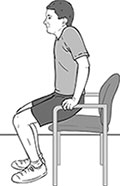
Keep the following tips in idea while you're sitting:
- Sit on a unfaltering chair with a neat back and armrests. Keep your hips and knees at 90 degrees (i.e., knees below hips).
- Don't sit happening low, soft or soft piece of furniture that may cause excessive deflexion of your hip.
- Conform to the precautions and weight down-bearing position as instructed by your health care provider or physiotherapist.
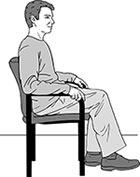
To stand, follow these 2 steps:
- Scoot to the edge of the bed/professorship. Avoid deflexion forward at your trunk.
- With your hands on the bang operating room professorship, push up to the regular position. Bring one hand at once adequate to your walker.
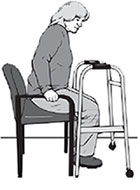
How do I safely strive for objects after a hip replacement?
Reaching typically requires too much bending and is typically non comfortable for people favorable hip operating theatr. It's recommended that for the opening four to six weeks afterward surgical procedure, you use long handled reachers. You can get reachers from your occupational therapist Oregon a medical supply store.
How do I safely get dressed aft a hip replacement?
For dressing, to forbid lifting your knee higher than your hip on the surgery side, you may need a long shoehorn and a dressing stick which will help you with your shoes, socks and pants. Remember to always put your operative peg in your pants first. If you wear shoes with shoe ties, try switching to elastic shoelaces.
How do I safely use the bathroom and bathe after a hip replacement?
Save a portable toilet (or a urinal) if a bathroom is distant from your bedroom. Don't try to mystify into the bath or to use an overhead shower. Use a pass-in type shower bath or take a sponge Bath until 11 days following your surgical procedure.
How do I safely walk after a hip replacement?
You'll need to use a walker or crutches which your occupational or physical healer leave provide for you. Make sure to stay on your crutches or walker until your healthcare provider or physical therapist advises that you use a lambaste. Your provider will decide how much weighting you seat put happening your surgery leg. In most cases, you will be able to put 100% of your slant on your surgery leg.
Your physical therapist will help you read how to use your walker or crutches correctly and help oneself you get the flop equipment. A bag operating theater basket attached to your walker leave allow you to carry small items when walk. Keep in psyche that walking does take effort following surgery. While somatogenetic therapy wish help you learn how to correctly purpose a walker or crutches, your retrieval is supported on your dedication to therapy and exercises following surgery.
How do I move on safely up and down stairs after a hip substitute?
Your physical therapist will Edward Thatch you the exact room to climb down and down stairs using handrails and/or crutches. Think of to use your good leg first, followed away the crutches and the surgery leg. When going down stairs, the crutches and surgery leg choke ordinal, followed by the angelic leg.
How can I safely give birth sex subsequently a hip replacement?
For positioning during sexual relations, make sure to consult your healthcare provider. Intercourse may be resumed approximately three weeks afterwards OR, following the precautions outlined by your provider.
What chores can I safely perform after a hip replacement?
Commend not to stoop excessively far operating theatre crouch when performing household chores. Chores that you should avoid that may postulate excessive bending include cleanup the deck, taking out the wish-wash and making beds.
How do I safely ride in a car and happening a flat after a hip replacement?
You may go out in a car (as a rider) approximately three weeks afterward you return dwelling, but make sure to avoid sports cars and cars with bucket seats because of the low seat height. When riding in a car, make sure to block up all 45 to 60 minutes to get knocked out and do some walking. Also, do ankle pumps in the car patc riding. If you're flying, request an aisle seat and keep the operant stage extended in the aisle. Request to cost boarded survive on the plane.
How should I get into a car later my total hip replacement?
- The first coach hind end should personify pushed all the way back before you enter the car.
- Have the device driver park on a flat surface and/or near the drive ramp.
- Walk toward car victimization the appropriate close device.
- When roughly the car, turn and begin backing adequate to the front carriage seat. Never step into the car.
- Stretch with your right hand and hold the door inning OR headrest. Place your left hand on the car seat or dashboard.
- Slow let down yourself to the car seat.
- Slide yourself back onto the car seat.
- Jiv your legs into the car. Try to move one leg at a time. Prevent your toes pointed up. Preceptor't intersect your legs.
- Reverse these steps to set about out of a car.

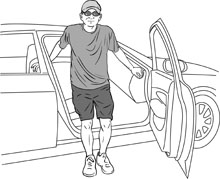
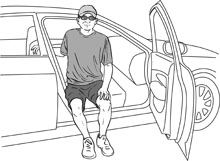
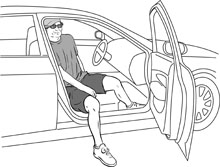
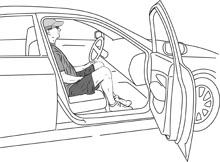
Oft Asked Questions
Can a rose hip replacement affect the bladder?
Your hip replacement surgery shouldn't touch on your bladder. Meet your healthcare provider if you're concerned about new symptoms.
Can I play sports after a hip replacement?
Hi-impact sports like running are generally not recommended. After you recovery from your surgery, and with your healthcare supplier's permission, you may resume low-down-impact sports like close, cycling, swimming and golf. Be sure to discuss your desired activities with your surgeon.
What are the survival of the fittest rates for a informed surrogate?
Survival rates are high. Less than 1% of people who have a hip replacement pass departed within 90 days following the operating room.
A note from Stephen Grover Cleveland Clinic
A hip replacement is a major surgery for hoi polloi whose daily life is sternly affected by debilitating hip to pain and loss of grasp of motion. Deciding to pursue a hip joint replacement is a decision that should not be assumed lightly. There are possible complications, and convalescence can take months.
Where Do They Usually Do the Left Hip Surgery at
Source: https://my.clevelandclinic.org/health/treatments/17102-hip-replacement
0 Response to "Where Do They Usually Do the Left Hip Surgery at"
Post a Comment